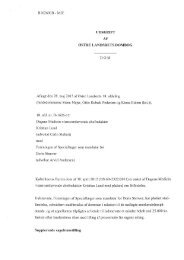Patientperspektivet på læge-patientrelationen i ... - Dagens Medicin
Patientperspektivet på læge-patientrelationen i ... - Dagens Medicin
Patientperspektivet på læge-patientrelationen i ... - Dagens Medicin
Create successful ePaper yourself
Turn your PDF publications into a flip-book with our unique Google optimized e-Paper software.
elationship. The 2 patients who did not care about having a regular GP were both under 30 years.<br />
This could indicate that the possibility of creating a continuous relationship is less important to<br />
younger patients. This does not, however, change the fact that the general theme creating patient<br />
satisfaction in the relationship for all of the 22 patients was to be taken seriously in the actual<br />
consultation, in other words to be recognised.<br />
Comparison with existing literature<br />
The results are consistent with several other studies that show a connection between continuity and<br />
patient satisfaction [4,12,18]. The new finding of this study is that it specifies the relationship<br />
between interpersonal continuity, trust and patient satisfaction. One study showed that trust was<br />
more important than continuity according to levels of satisfaction but did not explain why [18].<br />
Another study showed that “finding the right GP to talk to may be more important for patients than<br />
sticking with the same GP” [19]. The process of creating a relationship with a GP is an active,<br />
dynamic process [20] and the patients want “to be taken seriously”. To be taken seriously created<br />
trust, which other studies also have shown [21,22], but they did not explain why, in theoretical<br />
terms. There are no studies, either, that show what it means to the value of interpersonal continuity<br />
“to be taken seriously”. The main result in this study was that it was not valuable to have a<br />
continuous relationship unless the GP was recognising in his behaviour, i.e. was listening,<br />
understanding, confirming and accepting the patient. The process of recognition contains both<br />
empathy [23] and good communication skills [24], but it is more than that. It is a fundamental<br />
respect for the experience perspective of the opposite party [25]. This was necessary both in order<br />
to generate a good contact with the patient in the first encounter, and in order to sustain the<br />
relationship. The need for recognition, by both respecting and remembering, was reflected in the<br />
fact that the relationship was described as unsatisfactory if the GP did not remember the patient.<br />
According to the sociologist, Axel Honneth [26], recognising as a concept is crucial for generating<br />
identity today. The responsibility for self-realisation is to a great extent based on the individual<br />
because of the individualisation and thus, the requirement for recognition is increasing. The human<br />
being is created, according to Honneth, relationally, and recognition is a crucial component in the<br />
creation of a good interpersonal relation. It is a complex process to be acknowledging towards the<br />
patient, and it requires the GP to be constantly emotionally available. Therefore, the good doctor-<br />
patient relationship requires reflection by the GP which another study has shown [27], but this study<br />
suggests that recognition applies to all kinds of patients, not only patients suffering from chronic<br />
92








